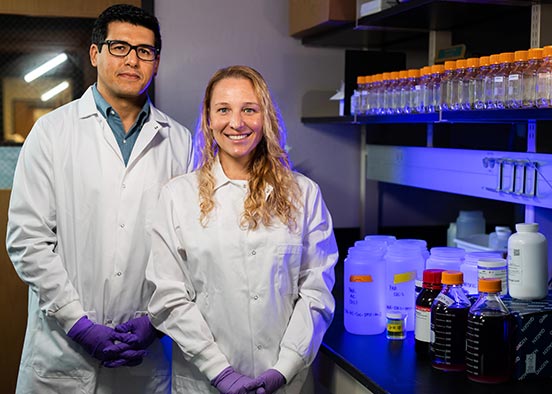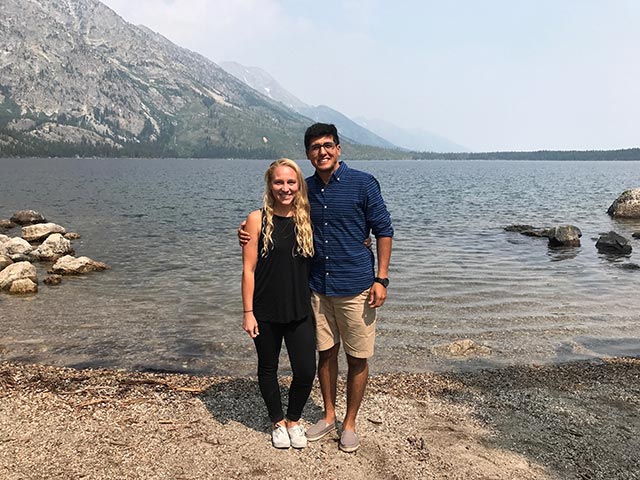Florida Gulf Coast University issued the following announcement on April 5.
What do TV comedy power-couple Jim and Pam of “The Office,” world-renowned scientists Marie and Pierre Curie and Hollywood stars Tom Hanks and Rita Wilson all have in common with two Florida Gulf Coast University professors?
Partnership in both love and work.
Osman Karatum and Lauren Redfern, Ph.D.s and assistant professors in environmental engineering, have been together almost eight years, four of which they’ve been married.

FGCU professors Osman Karatum and Lauren Redfern are a team in both the research lab and in life. Photo by James Greco/FGCU.
Their love story began at Duke University in October 2013, when Karatum and Redfern were both earning doctorates in civil and environmental engineering. Not only did they run in the same friend groups, but their research labs were located across the hall from each other. It seemed the two were fated to meet.
The first time they connected both were trying to score seats to a Duke men’s basketball game. They crossed paths when they were camping with a few friends. This was when Redfern knew she had a crush on Karatum. It wasn’t long after this encounter that the pair started dating.
“I developed a crush on him during the first month I went to Duke,” Redfern said.
Their relationship flourished beyond Duke, where Karatum completed his doctorate in 2016 and Redfern in 2017. Post-graduation, the couple married and moved to California to work in environmental and legal consulting. They did this for a couple of years until they realized their true passions lie in teaching environmental engineering.
“Part of the reason I like being a professor is that I want to influence students in the way that I was influenced by some of my favorite professors,” Redfern said.
Karatum’s curiosity drew him to teaching. He had received his bachelor’s in food engineering from Ege University in Izmir, Turkey. His goal is to teach and learn more about the environmental impacts of food waste.
When they aren’t teaching, the two are conducting aquatic-based research. Both relish the opportunities The Water School brings to the university.
“With the new school being so close to the water and having a big emphasis on water, I think it’s been a really nice fit for our research and teaching interests,” Redfern said.
Karatum and Redfern received funding to work in collaboration with the U.A. Whitaker College of Engineering and The Water School over the summer.
“The Water School is going to open up a lot of opportunities for the both of us … you know, expanding the current project and new collaborations,” Karatum said. “We’re super-excited.”

Redfern and Karatum in the Grand Tetons in Wyoming in 2017. Photo submitted.
This dynamic duo has teamed up on multiple projects, with each also working on independent research.
Together, Karatum and Redfern are studying the use of imitation wetlands to remove unwanted pollutants and nutrients. These mock-ups are floating mats with plants placed on top, and they float where the nutrients need to be removed. This research is conducted in multiple bodies of water, including lakes and leachate ponds.
Meanwhile, Karatum is working separately on a water-energy-food initiative. He hopes that this initiative will assist in using food waste as a renewable energy source. The research team wants to introduce this type of renewable resource to every home in the future.
While microbial and bioengineering is Redfern’s specialty, Karatum loves chemistry. These complementary niches help the pair brainstorm and exchange ideas. “Having a different perspective is helpful,” Karatum said. “When I focus on chemistry, sometimes I miss something simple, or the little things that Lauren might be able to see.”
Karatum and Redfern seem to have a deep understanding of one another, and each have a distinct knowledge they bring to the table. This dynamic helps in the distribution of tasks and efficient lab work.
“There aren’t too many cooks in the kitchen,” Redfern said. “Like, ‘OK, I’ll work on the microbe stuff, you work on the chemistry stuff,’ and we have division.”
Karatum was an international first-generation college student while Redfern is a Florida native. They believe that by embracing their diversity, they can accommodate students of different backgrounds.
“I think having a more diverse team helps us mentor better,” Redfern said. “When we work together, we have different perspectives and different backgrounds too.”
They believe their work-life balance has strengthened their relationship. “I think you just have to have all of these facets of your relationship that are more than just a romantic partnership,” Redfern said. “A lot of it is a deeper type of partnership, especially when you work together.”
When their work at FGCU is done, it’s family time. Karatum and Redfern recently welcomed a baby boy into the world – Ozan, which means “poet” in Turkish – and their home, which they also share with their dog, Beefy.
“When your partner is your co-worker, your co-parent, your roommate and your financial partner, I think just being able to function through different types of partnerships is probably the best strength,” Redfern said.
—Avalon Gordy is a junior journalism major who’s part of an internship program coordinated by FGCU Marketing and Communications. Students interested in earning paid internship credit can contact Keith Gibson at kgibson@fgcu.edu.
Tags: engineering, fgcu, florida gulf coast university, Lauren Redfern, Osman Karatum, the water school, Whitaker College
Original source can be found here.



 Alerts Sign-up
Alerts Sign-up